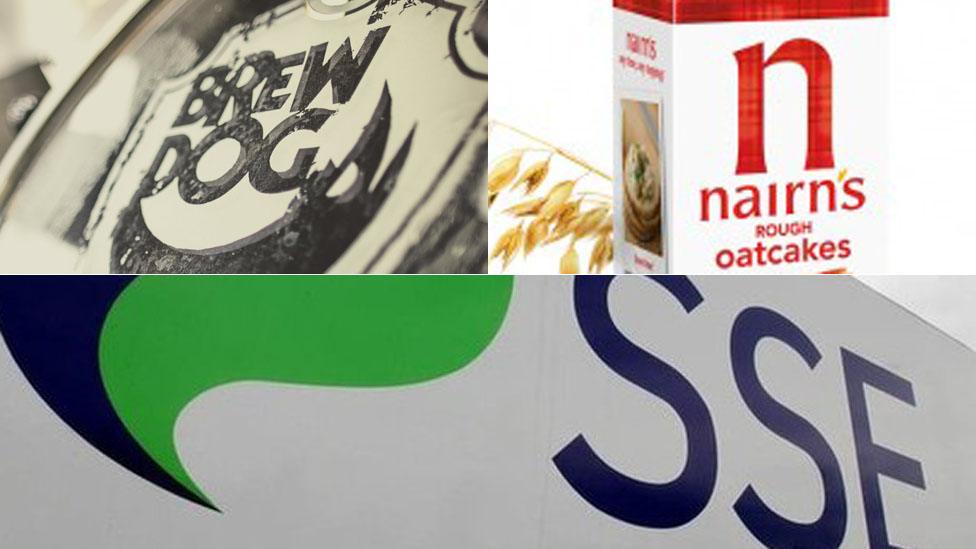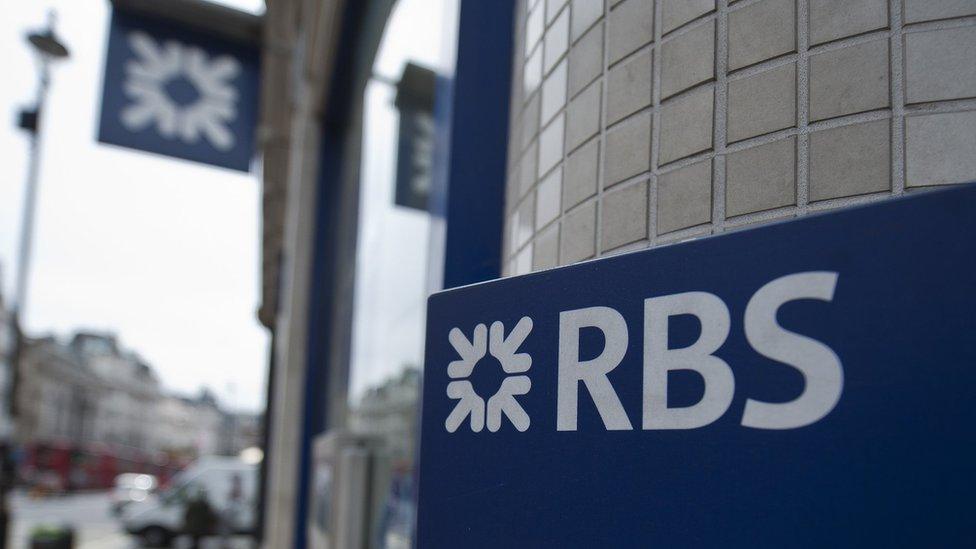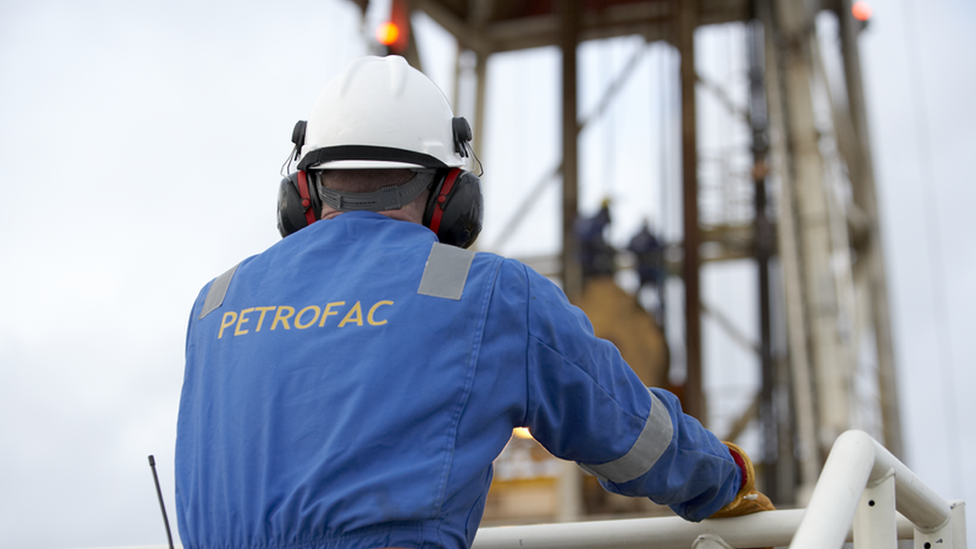Scotland's bigger firms: Tuned in, turnover and dropped out
- Published

Kerrrrangg. And then Kerrrchingg. Who knew that a small Scottish specialist retailer was turning over £22m selling guitars?
Not me. The last time I bought a guitar was about 35 years ago. It's acoustic, and now in need of a duster, new strings and someone who can remember how to play it.
GuitarGuitar, with its roots in Edinburgh and Glasgow and three more stores in England, is clearly well known to those now in the market - not only for a Gibson Les Paul or a Yamaha", but for amps, drums and home recording equipment.
It claims to be the UK's biggest guitar supplier, with profits last year of £2.4m and 99 employees.
After 13 years in business, that is explained by a lively, well-conceived website, and full-on riffing through social media to strike a power chord with this tech-savvy community.
The company was recently named by the London Stock Exchange as one of a thousand firms to inspire Britain.
But I admit: it only came to my attention through becoming a new entrant at the lower end of Scotland's "Top 500" companies.
Hydro power
This is the annual listing - just published - of Scotland's biggest firms, with turnover above £20m and measured by a formula of turnover, profit and workforce.
Other new entrants this year include Brewdog, Nairn's Oatcakes, Lindsay & Gilmour retail chemists, Gleneagles, and the Scottish Football Association (turning over £39m in last year's accounts).

Out go Murray International Holdings, Tullis Russell papermaking co-op and some big firms, mainly in energy, which no longer publish accounts in comparable form.
At the top of the Top 500 is SSE, based in Perth and perhaps better known to you as Scottish Hydro, with a rise in profits reported last year which saw it replace Standard Life.
Royal Bank of Scotland has its registered headquarters in Scotland, and of course, it dwarfs any other company.
But for well-publicised reasons, its profitability hasn't looked that great in recent years, so it has had to mix with the mid-range companies in this listing.
The Scottish Business Insider magazine, which compiles and publishes the annual list, explains that RBS last year reported an attributable loss of £3.5bn for 2014, reflecting a big write-down of the value of its Citizens Bank arm in the USA.
But its pre-tax figure - used for consistency across this listing - moved from an £8.2bn loss for 2013 to a £2.64bn profit in last year's results.
That can make a mighty big difference to your placing, so RBS moved from number 287 to number two.
Current accounts
If you include RBS and Bank of Scotland, profits across the Top 500 were up 34%, but if you exclude them, total profits fell 17% to £7.9bn, on turnover of £159bn. Of the Top 500, 167 firms saw profits decline, while 298 saw them rise.

Leaving aside the banks, profit per employee - with 571,000 employed across the 498 others - has nearly halved since before the financial crunch, to £12,900.
The banks create only some of the anomalies. While RBS, Scottish Widows and Aegon provide financial services to a customer base largely outside Scotland, as do top ten companies Wood Group, Weir Group and Aggreko, some big players in the Scottish economy have no separate Scottish accounting with which to list them.
So there's no sign of Diageo, with 40% of the Scotch whisky industry, nor big employers like the supermarkets (except for Tesco Bank, based in Edinburgh), nor big-employing outsourcers such as Capita, Serco and Mitie, no BP or Shell, nor big manufacturers such as BAE Systems and Rolls-Royce.
(Nor indeed, the BBC, where the absence of Scottish accounts is a matter of some political controversy.)
Oil spills
Some big multi-national corporations do publish figures for Scottish operations, or more often UK operations based in Scotland.
And notable among them in this year's listing are the offshore oil and gas explorers and producers.
They were among the big fallers, as the sector saw turnover down 12% (in this listing) to £7.4bn.

Profits tumbled too. Maersk Oil North Sea (UK), part of the Danish giant, reported a £367m loss, moving it from 26th to 309th position.
Dana Petroleum, owned by the South Korean state oil corporation, made a £462m loss, moving it from 20th to 312th position.
Petrofac Scotland plunged to a £351m loss, Asco Group lost £308m, Faroe Petroleum reported a £166m pre-tax loss, Taqa Bratani (owned in Abu Dhabi) lost £351m and Ithaca Energy (headquartered in Canada) lost £82m.
Volatile sectors
Two points to bear in mind about this. The figures used in this listing were those published during 2015. That means many covered the calendar year 2014, and most others covered most of 2014.
So the oil and gas figures only reflect the start of the oil price downturn, which began gathering pace in autumn of that year. It seems likely that a much stronger picture of stress and distress in that sector will become clear with the Top 500 a year from now, and it may also reflect on the oilfield services sector and engineers in the supply chain.
The other point is that the listing shows how important the oil and gas industry is to corporate Scotland. The nature of the business means it needs companies of scale, so they are more likely to appear in this list than, say, tourism firms.
But when you note that the top ten companies include five in financial services and five in various forms of energy, it's a reminder how concentrated the economy has become in very few, quite volatile sectors.
***A final note about Scottish Business Insider: its editor, Alasdair Northrop, is standing down after 15 years in charge of the monthly magazine and compiling the Top 500 and other listings. In an unusual career move, he's becoming a full-time tourist guide.
- Published6 January 2016
